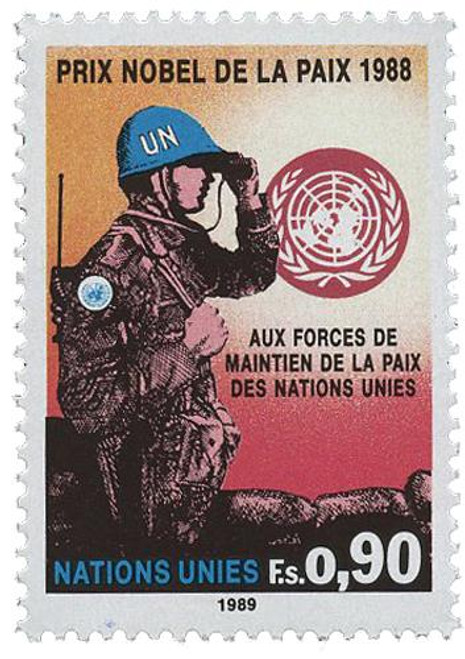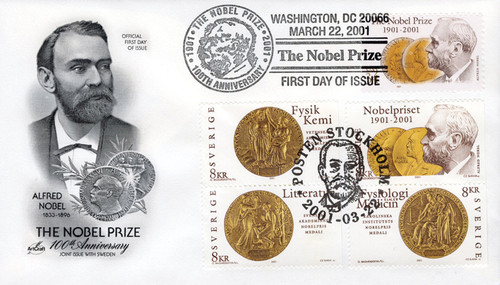
# UNV301 - 2001 Nobel Peace Prize
On December 10, 2001, the United Nations and U.N. Secretary-General Kofi A. Annan were awarded the Nobel Peace Prize for their work toward a better organized and more peaceful world. The stamp was issued on the day of the award ceremony to commemorate both the event and the 100th anniversary of the Nobel Prize.
Alfred Nobel, the inventor of dynamite, bequeathed the bulk of his fortune to establish the Prize which bears his name. Nobel specified that the awards be given, with no regard to nationality, “...to those who, during the preceding year, shall have conferred the greatest benefit on mankind” in the fields of physics, chemistry, physiology or medicine, literature, and peace. (An additional award for economics was funded by the Bank of Sweden in 1968.)
Several U.N. personnel and U.N. organs have received the Nobel Peace Prize in past years, beginning with Ralph Bunche in 1950, and including UNICEF in 1965. The Nobel Prize remains the world’s most highly regarded award.
On December 10, 2001, the United Nations and U.N. Secretary-General Kofi A. Annan were awarded the Nobel Peace Prize for their work toward a better organized and more peaceful world. The stamp was issued on the day of the award ceremony to commemorate both the event and the 100th anniversary of the Nobel Prize.
Alfred Nobel, the inventor of dynamite, bequeathed the bulk of his fortune to establish the Prize which bears his name. Nobel specified that the awards be given, with no regard to nationality, “...to those who, during the preceding year, shall have conferred the greatest benefit on mankind” in the fields of physics, chemistry, physiology or medicine, literature, and peace. (An additional award for economics was funded by the Bank of Sweden in 1968.)
Several U.N. personnel and U.N. organs have received the Nobel Peace Prize in past years, beginning with Ralph Bunche in 1950, and including UNICEF in 1965. The Nobel Prize remains the world’s most highly regarded award.











